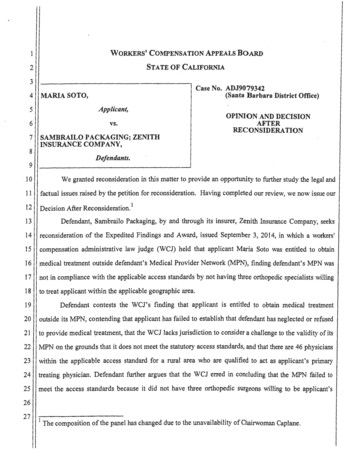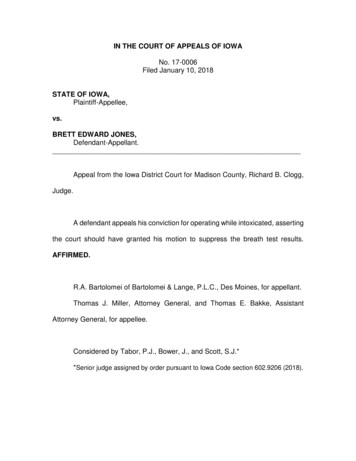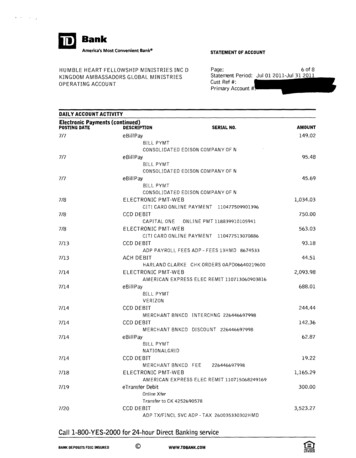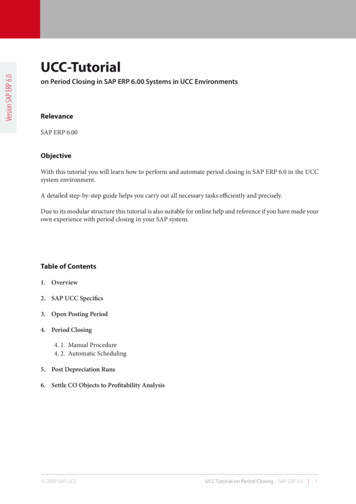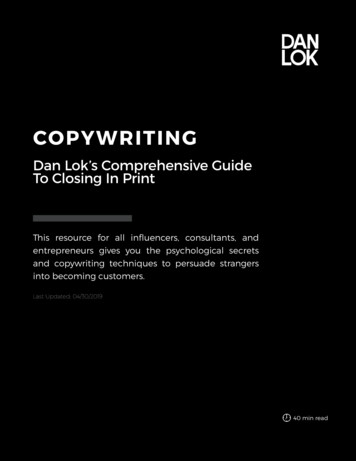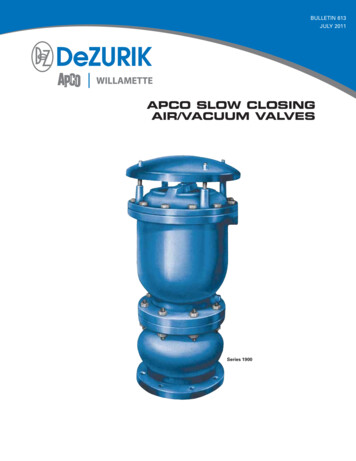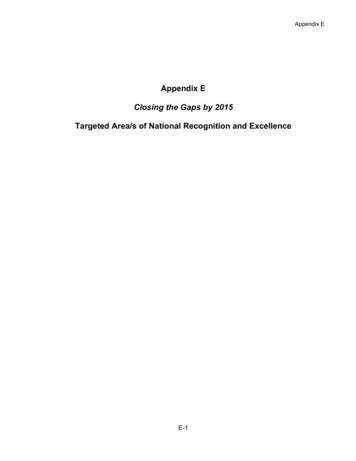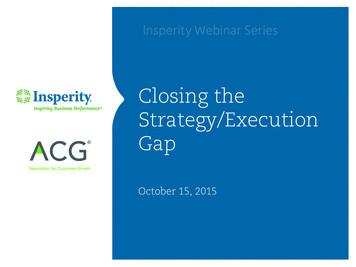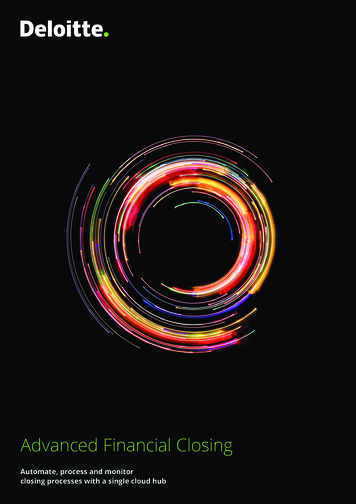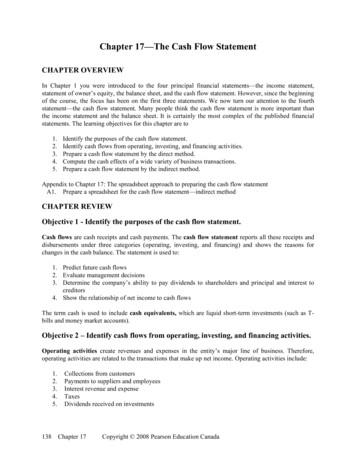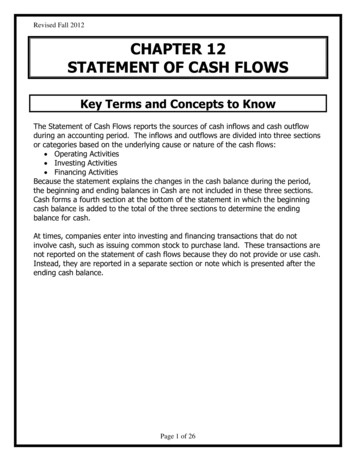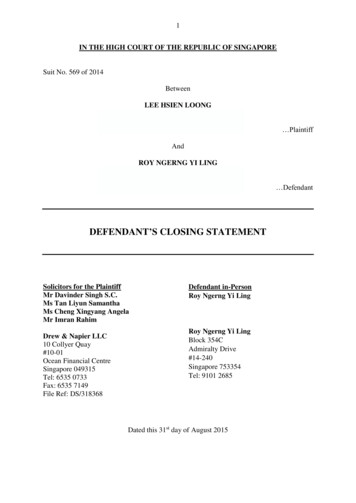
Transcription
1IN THE HIGH COURT OF THE REPUBLIC OF SINGAPORESuit No. 569 of 2014BetweenLEE HSIEN LOONG(NRIC NO. S0016646D) PlaintiffAndROY NGERNG YI LING(NRIC NO. S8113784F) DefendantDEFENDANT’S CLOSING STATEMENTSolicitors for the PlaintiffMr Davinder Singh S.C.Ms Tan Liyun SamanthaMs Cheng Xingyang AngelaMr Imran RahimDrew & Napier LLC10 Collyer Quay#10-01Ocean Financial CentreSingapore 049315Tel: 6535 0733Fax: 6535 7149File Ref: DS/318368Defendant in-PersonRoy Ngerng Yi LingRoy Ngerng Yi LingBlock 354CAdmiralty Drive#14-240Singapore 753354Tel: 9101 2685Dated this 31st day of August 2015
2DEFENDANT’S CLOSING STATEMENTA. Introduction1. I am Roy. I am 34 this year. Little did I imagine that one day, I would be sued by theprime minister of Singapore. Throughout my whole life, I have tried my very best tolive an honest life and to be true to myself and what I believe in.2. When I was in primary school, I would reach out to my Malay and Indian classmatesto make friends with them because I did not want them to feel any different. Thiscontinued when I went to secondary school and during my work life. Some of myclosest friends have been Singaporeans from the different races. From young, Iunderstand how it feels to be different and I did not want others to feel any differentlyabout who they are.3. But it is not an easy path in life, for life is about learning and growing as a person, andsometimes life throws challenges at you, and you have to learn to overcome it to becomea stronger person. Sometimes you make it, sometimes you don't. But there is alwaysanother chance, for life does not forsake you. Only you forsake yourself.4. In primary school, I was one of the top students in class, and sometimes in school. Thiscontinued when I was in secondary school and junior college. I was also on the Dean'sList for one semester in university. But I came from neighbourhood schools, first inAng Mo Kio Primary School and Hong Dao Primary School, and later in MayflowerSecondary School and Serangoon Junior College. I also come from a humblebackground. When I was born, we lived in a rented one-room flat in Ang Mo Kio withmy grandparents. We later moved to a rented two-room flat in another part of Ang Mo
3Kio. My family was poor so that was what we could afford at that point. Growing upin a poor family meant that we had to learn to spend and save wisely. My parents wouldonly bring us to watch movies or to eat at fast food restaurants on very specialoccasions, and that was if we did. I did not hang out with my friends at McDonald'suntil quite late into my teenage years and even then, I would just buy an ice-cream coneto eat it, while eating my lunch at the school canteen before meeting up with my friends,so that I could save.5. So I understand what it feels like to be from a different background and to bediscriminated. When I was in secondary school, that was when the name-calling started.Almost immediately after I started school, my schoolmates started calling me, "AhGua", a derogatory term for a homosexual. How does a Secondary One student dealwith such shame and embarrassment at my age? It was not easy. Once I had to go onstage to receive an award but as I walked on stage, the whole school started booing atme. It did not stop, even as I received the award, shook hands with my teacher, andwalked down the stage. It did not stop even as I was leaving the stage. I had to composemyself as I walked past the school hall and the students, before I took off to find solace.This happened many times in my secondary school life. But wanting to be honest withyourself and happy with yourself helps you to stay sane. And it helps that I hadschoolmates who knew what I am like as a person and who stood by me, and perhapstook pity in me. Eventually, by the fourth year in secondary school, my otherschoolmates began to understand what I am like as a person. The name calling beganto get lesser and the people who used to call me names also started to make friends withme. I was touched and happy that after so many years of enduring the name-calling thatthings were starting to get better, and I was grateful.
46. You see, I understand how it feels to be distressed and embarrassed. And thus I wouldnever want to wish it on anyone. I would not want the Plaintiff Mr Lee Hsien Loong togo through it as well. As such, I do sincerely apologise for the distress andembarrassment that he felt. My many years of being discriminated showed me the painand anguish of how it feels and I cannot possibly want for someone else to have to gothrough it. No person should have to go through what I did.7. For I believe in the saying, do not do unto others what you do not want others to dounto you. And this is something I live by as well.B. It was never my intention to defame the prime minister nor did I ever wanted todo so, because I wouldn’t be able to bring myself to8. Later on in life, when I meet with other gay people who had to go through similarbullying, I would share with them my experiences, to let them know to be strong andto learn to accept themselves, and to believe in themselves, so that they would be ableto overcome these episodes and grow as people. But even then, it still wasn't easy forme. The many years of discrimination in school caused me to look down on myself,and to develop low self esteem. For many years during my late teens and until my latetwenties, I did not believe in myself as a person. I could not have a proper relationship,as I thought so badly of myself that I did not believe that I deserve each relationshipthat I could have otherwise entered into. It was only after more than 10 years ofstruggling with myself that I decided that enough was enough. I had to either choose tolearn to be happy or I could go on wallowing in self-pity. I chose to be happy. But itwasn't easy. How do you tell yourself that you can believe in yourself and that you aregood enough after so many years of believing otherwise? But after reading more thana few hundred self-help books, I managed to pull through.
59. But life wasn't all difficult. By the time I turned 20, mom had worked very hard in manydifferent odd jobs and part-time jobs, and dad as a hawker, to finally save enough to beable to buy a 4-room flat. Dad has been working tirelessly as a carrot cake seller formore than the past 20 years. Fortunately, my parents bought the flat just at the turn ofthe century where prices were still low, after the crash in 1998. When I was serving innational service, I was also a "garang" soldier. I held the belief that if we could worktogether to get things done quickly, we could be more efficient and get to rest earlier.It helped that when other soldiers saw how I worked hard to help everyone that even asthey would know that I am gay, it didn't matter. There was a respect that they hadtowards me, and that we had towards one another.10. Indeed, my whole life, I have aspired to live as honestly as I can, and to live my lifewith integrity. I needed to answer to myself as a person. I needed to know that what Ido is out of the goodness of what I believe in, and of righteousness. My parents namedme, 义林. "义" means "justice". This belief in justice, in right and wrong, and in beingtrue and genuine has been what has always guided me in life. As such, in the jobs I take,it has always been guided by this belief that I want to help, and to make our society abetter place. When I was in university, I volunteered with children with autism andattention deficit hyperactivity disorder. I also volunteered with mentally-ill patients atthe Institute of Mental Health. Later on, I worked as a therapist to teach children withautism. I would develop new playthings so that I could make it more interesting for thechildren. One parent appreciated what I did so much that she said that if she were tohead a school for children with autism, she would hire me as a teacher. It was alsobecause I wanted to contribute back to society that I went on to work at the HealthPromotion Board and Tan Tock Seng Hospital, to develop educational and awareness
6programmes on HIV. My own experiences have taught me how people who take risksdo so because they are discriminated against and therefore become dejected, leadingthem to also take risks. I wanted to develop programmes to allow people to becomestronger, and to learn to protect themselves.11. Even when I was young, it was this sense of duty and responsibility that made mechairpersons in my class, a prefect in primary school and later on a student councillorin secondary school. I was also the class representative in junior college, as well as forthe different subjects in class. My commitment to the things I do led me to win the BestEmployee Award at the Health Promotion Board and the Best Soldier Award duringreservist. In my life, I have always strived to work towards the betterment of our societyand to do what I can, in my capacity, to make things better. This is what I believe in.This was also why I started my blogs, The Heart Truths, and My Right to Love. Ineverything that guides me, it is always to do good. It is always to think about how wecan have a better society. It is about how people can live happier lives and be moreconnected to themselves.12. I do not believe in hurting people for the sake of it. I do not believe in maligning people.I do not believe in making personal judgments against other people. It is not in mycharacter and personality to do so. As such, I would never want to defame the primeminister because in the first place, I would never be able to bring myself to do such athing which is against my integrity and conscience to do, I simply cannot. For as I havesaid, I believe in the saying, do not to unto others what you do not want others to dounto you. I cannot want to cause any harm to Mr Lee if harm is not what I believeshould be done upon me, or onto anyone else. I simply cannot.C. I speak up and write because I wanted Singaporeans to be protected
713. When I started my blog, The Heart Truths, three years ago, it was because I had reacheda certain level of awareness and happiness with my life that I thought to myself thatothers should also have a chance at happiness as well. My job at that time brought meto Australia, Austria, and the Netherlands for meetings and conferences. I saw formyself how people in these countries were relaxed and how they were not onlycommitted in their work but also had time for themselves to develop their own lives. Isaw a people who were socially conscious and who would take care of one another insociety. Then I started to question, why it is that Singapore has become one of therichest countries in the world, by GDP per capita, but yet our people are stressed,unhappy and our society has become less trusting.14. I decided to start writing about what I observed in our Singaporean society, so that wecan advocate for better policies to improve our lives, and so that people can becomehappier. To me, coming into this life is about learning about what life is about, to gothrough experiences that help us learn to become better people, and to developourselves spiritually to reach our fullest potential as beings. At the end of the day, lifeis not about struggling to grow the economy. Life is about fulfilling our inner needs, tobecome connected to the truth within and to have the clarity to uplift our people andour society. This is life. As much as it is a cliché, when we die, we are not going to takewith us the money that we have made. What we will bring with us are the lessons wehave learnt and the soul that we have become.15. And so, I started writing about wages, jobs, healthcare, education, housing, transport,retirement and social protection - these which I believe are areas a government has aresponsibility to provide for its citizens. I wanted to advocate to the government tocreate better policies to protect the lives of Singaporeans. I believe that at the current
8cost of living in Singapore, the government should implement a minimum wage to atleast S 1,500 or even S 2,000, coupled with increased health subsidies to about 70%of total healthcare expenditure (which is the average that the governments of otherdeveloped countries would spend), provide free education from childcare to universityfor all Singaporeans (especially so since the government would give an estimatedS 400 million every year for foreign students to study in Singapore), to reduce flatprices by removing the land cost component which is estimated to take up 60% of flatprices, to provide unemployment benefits for Singaporeans who have lost their jobs andto return the interest earned on Singaporeans' Central Provident Fund (CPF) so that theywould be able to earn enough inside their CPF to be able to retire on. For me, these arebasic things that the government has a responsibility to do.16. But when the government run by the People's Action Party (PAP) refused to do so, Iwas initially perplexed. Why wouldn't the government implement policies to protectSingaporeans? The PAP government refused to define a poverty line and implement aminimum wage to that level. The PAP government refused to substantially increase itshealthcare expenditure while more and more Singaporeans have been reported to haveto choose to die instead of seek medical help. The PAP government insists on givinghundreds and millions of dollars to foreign students while causing many Singaporeansto go into debt paying for one of the most expensive, if not the most expensiveuniversity tuition fees in the world, for citizens. The PAP government would makeSingaporeans pay for the most expensive public housing in the world, one of the mostexpensive travel concessions and would give Singaporeans one of the lowest, if not thelowest interest rates on our retirement funds in the world. I was in disbelief at what thePAP government insists on doing, in spite of the feedback that Singaporeans, academics
9and economists have given. Why would the PAP government not take care ofSingaporeans?17. At the same time, the PAP government would fight to pay themselves the highestsalaries in the world. Meanwhile, the rich in Singapore were earning the highest salariesamong the developed countries and paying the lowest tax and CPF. The PAPgovernment has increased their own salaries and reduced the tax that they have to pay,while making Singaporeans earn one of the lowest wages among the richest countriesand pay the highest social contribution into our CPF for retirement in the world, causingSingaporeans to have the lowest purchasing power among the developed countries. Allthese shocked me. Why does the PAP government not want to take care ofSingaporeans?18. As I researched more, I began to understand why. The PAP government has since the1980s started creating policies to turn against Singaporeans. In 1982, the PAP changedits party constitution to remove the aim of "abolishing wealth inequalities" and replacedit with the want for Singaporeans to be self-reliant. In 1984, the PAP governmentcreated the Medisave. By 2013, Singaporeans had contributed more than S 65 billioninto the Medisave but Singaporeans were only allowed to withdraw S 799 million fromMedisave for Direct Medical Expenses. This meant that Singaporeans were onlyallowed to use 1.2% of the total Medisave balance while more than 98% went intosurplus. In 1987, the PAP government created the CPF Minimum Sum. Today,Singaporeans would need to have a minimum of S 161,000 inside their CPF whichotherwise they would not be able to withdraw any excess CPF monies at the age of 55.However, where the wages of Singaporeans have been depressed for the past 10 to 20years and where the CPF interest rates have been depressed to 2.5% to 4% since 1999,
10while the CPF Minimum Sum have in some years grown by more than 10%, certainlymore and more Singaporeans would therefore not be able to meet the CPF MinimumSum and not be able to retire. In 1990, the PAP government created the MediShield.However, from 2001 to 2010, a surplus of S 850 million had been accumulated insidethe MediShield but in 2011, Singaporeans were allowed to only make S 282 million inclaims from MediShield. This meant that Singaporeans were only able to use less thana quarter of the MediShield balance, while more than 75% becomes surplus that thePAP government gets to keep. However, Singaporeans do not know where all thesurpluses that we have paid have gone to.19. Where the Organisation for Economic Co-operation and Development (OECD) had atthe time of writing the Article that I was sued for, showed that Singaporeans have theleast adequate retirement funds among the OECD and Asia-Pacific countries and whereeven the main spreadsheet in Singapore, The Straits Times, had reported thatSingaporeans have to choose to die because they cannot afford healthcare, this thenquestions the PAP government's accumulation of such high surpluses whilst notreturning the money back to Singaporeans. Where I had traced at that time that the PAPgovernment has taken Singaporeans' CPF to invest in the GIC and Temasek Holdingsand where the Sovereign Wealth Fund Institute had ranked GIC and Temasek Holdingsas the 8th and 10th richest sovereign wealth funds in the world, then this also questionsthe PAP government's method of withholding the interest earned on Singaporeans' CPF,to give to GIC and Temasek Holdings to earn such high profits with, whileSingaporeans have to settle with the least adequate retirement funds among the OECDand Asia-Pacific countries. For me, this doesn't make sense. Why is the PAPgovernment taking the CPF monies to earn such high profits in the GIC and TemasekHoldings but causing Singaporeans not to have adequate to retire on, and why does the
11PAP government take the Medisave and MediShield monies of Singaporeans toaccumulate such high surpluses while allowing Singaporeans to use so little, so muchso that Singaporeans have to choose to die instead of go for healthcare, and suffer. Myonly logical conclusion is that the PAP government does not want to take care ofSingaporeans and that it only wants to make money off Singaporeans. If so, the PAPgovernment is no longer a government that is in the interests of Singaporeans and itwould be pertinent for Singaporeans to vote the PAP out, and to vote in a newgovernment which will implement policies to protect Singaporeans.20. When I first started writing on my blog, I had believed in the PAP government. At thattime, I thought that the PAP government did not have its ear to the ground, so I thoughtthat by writing and providing my viewpoints, it would add to the chorus of voices whichwere trying to help the government understand what was happening on the ground, andhow the government would then be able to create better policies to protectSingaporeans. After two year of writing and researching, and understanding how thePAP government's policies work and their intentions behind the policies, I felt that Icould no longer stand by and watch while the PAP government continues to createpolicies to hurt Singaporeans. This is not right. The PAP should not be allowed to hijackgovernment for its own purposes of making money and thereby hurting the very livesof Singaporeans. We cannot let this happen. We have to protect Singaporeans. For ifSingaporeans are not taken care of, and if Singaporeans no longer feel proud ofSingapore and give back to the country, how will Singapore be able to survive into thefuture? The PAP can choose to operate Singapore like a business and turn Singaporeinto its own company. But Singapore is an island. Singapore is a country. If Singaporecan no longer generate profits on this island, you cannot uproot the island and move itto another city to make even more money. If Singapore fails, Singapore fails on this
12island, and every inhabitant with it. What then will be of our country? What then willbe our people?21. And this is why I write on my blog. We cannot stand by and watch while we know whatis happening to this country and how this country will go down, if it continues underthe PAP. It is not just the lives of Singaporeans who are hurting now, it is also the futureof our country, where the inequality that the PAP has entrenched in Singapore will onlycreate further social problems down the road and corrupt the lives of Singaporeans'lives further. We have to guard against such demise. We have to protect Singaporeans.And this is why I write. It is not because of courage. It is not because of stupidity. It isbecause I believe that for the lives of Singaporeans to be protected and for our country'sfuture to be safeguarded, we need to stand and fight. It is not a choice. If we so believein our lives and in our country's future, so that our children will still have a home to livein, we have to fight. It is not a choice. We have to protect our homes.22. For the Article that I was sued for, it is with this very same idea that I wrote it. In fact,in all my articles, they are also written in this belief that we need to protect ourselves,our home and our future, and therefore, we have to fight against the PAP, to vote it outof government and to vote in a new government to protect our country. We have to. Itis nothing personal against the PAP but we need to vote for a government that wants toprotect Singapore and Singaporeans.D. I will not want to cause distress and embarrassment to Mr Lee because I knowhow it feels and would never want to wish it on another person23. Mr Lee's lawyer, Mr Davinder Singh, might want to claim that I wrote the articlebecause I wanted to “disparage (Mr Lee) and impugn his character, credit and
13integrity”, and to “attack” him. I cannot imagine why I would want to do that. As I havesaid, I cannot want to cause any hurt to Mr Lee. It is not in my character and personality,nor is it in my integrity and conscience to want to do that to Mr Lee. Before I met MrLee in court, I have never met him before. In court was the first time that I met Mr Lee.From what I have heard from people who have met or spoken to him, and people whosaid they know him, as well as what I have read from his speeches and interviews orwatched from the videos of him, I had believed that Mr Lee is someone who iscompassionate and someone who is gentle and understanding. As such, my personalknowledge of Mr Lee from third party sources had given me a man whom I would havea certain respect for. That his background is very different from mine - mine being froma poorer background - would mean that he would face different challenges in life fromme, but challenges nonetheless. I cannot imagine the difficulties that Mr Lee must gothrough as a person, where just as I had faced discrimination, so would I imagine hewould in his position. And I do think that this would be similarly difficult for him to gothrough. As I have said, I believe that all of us come into this life to learn, and to gothrough challenges in life to grow and become better people. And I believe this to beso, whether we are rich or poor. Just as Mr Lee would not be able to understand thestruggles that I have to go through, so will I not be able to understand his. It is my beliefthat it is a heavy responsibility for him to grow up as the man who is son of the primeminister of Singapore, and later on to become the prime minister himself. How do youmanage the stress and pressure of growing up and being as such? It cannot be easy andI do not want to judge Mr Lee for what he has to go through. My personal thoughtstowards Mr Lee is as much as this. I do not have other information which would informme of otherwise. As such, I would not make comments about him, let alone write a blogpost, which would critique him on a personal level, or which would make unfavourable
14remarks against him. I do not have the intention to defame Mr Lee. Rather, I empathisewith Mr Lee.24. Even if I did not have any understanding of Mr Lee, I wouldn't have the intention todefame him as well, because my character and personality simply will not allow me todo so. Why would I want to criticise another person? This makes me small and petty.Where I had to live with judgement and discrimination, and still do, this alone wouldallow me to understand the feeling of hurt from being on the other side, and would notallow me to pass on this hurt to another person. To do so would be meaningless becauseone day, the hurt will only come back to me. Where we keep being angry and hurtfulover things and pass it on, such will only keep going round and round. When will thisever end? When will our suffering be ever put to a stop? Suffering can only stop whenwe ourselves decide to put an end to it, and thereby stopping us from carrying it anyfurther. The more of us who do it, the more the suffering will cease to exist.25. Where I was called names and discriminated, and where I faced many failed would-berelationships (they only went as far as being dates), I had to learn to understand whypeople would call me names and why they would discriminate against me. I had tounderstand why people would choose not to be in a relationship with me. Sometimes,it was because my own insecurities was too much for them to take. Sometimes, it wasbecause of their own insecurities and thereby they judge me, as a form of selfprotection. Sometimes it was because of their own past experiences which they haven'tmoved on from and sometimes, it was mine. And sometimes we just do not relate aspeople with each other, and this is nothing personal. I have thus learnt to understandthat at different stages of our lives, we might not know best and might therefore hurtanother. But who am I to judge the other person whom I think has hurt me, when I have
15myself at different points in my life in the past would have also done the same as himto another? And if I understand that I might have been insecure and thus might havecaused hurt to another back then, then surely, I can understand that others mightsimilarly be insecure and therefore can cause hurt to me as well. If so, then surely it isin my position to forgive and not to get angry with another? What we can only do is tobe responsible for our own feelings and emotions. People need time to learn to surpasstheir insecurities, but I on my own can learn not to be affected. Similarly, if I am tounderstand how it feels to hurt someone and be hurt in return, and I have learnt that itwould be meaningless to keep passing on this hurt as it would only return to me oneday, I would not want this hurt to be caused to another. I would not want to defame theMr Lee, first because I do not know him personally, and even if I do, I as a personwould not want to hurt him. It is not right as a human person to hurt another humanbeing, and not just that, but other living beings as well.26. In fact, when I was young, when I would squat on the toilet bowl to pass a motion andwhen I see ants struggling in the water or trying to climb out of the toilet bowl, I wouldput my finger to scoop up the ant (even if there were faeces inside the water), or to letit climb on my finger, then place it on the wall, so that it would be able to live. And Iwould do that for each ant I see stuck inside the toilet bowl. For the life of even one antis as precious as ours. I would still do so till this day, but fortunately, the toilet at homeno longer has as many ants but if I do occasionally see them on the toilet floor before Ishower, I would still do the same. But this is the person that I am. I would not even killan ant. And I would not want to hurt the prime minister, or cause any distress orembarrassment to him. It is not in my nature to do that.
16E. I omitted information from the Channel NewsAsia article because I did not believethat Mr Lee had misappropriated the CPF monies of Singaporeans27. For the Article that I was sued for, it was written in the same strand. There is nointention whatsoever to want to defame the prime minister. In fact, it did not even crossmy mind to think that he had misappropriated the CPF monies of Singaporeans. Thiswas not something I thought about because my criticism has always been directed atthe government and its management of our CPF monies. At no point in time was itdirected at the prime minister. Ironically, it was the prime minister who said that I hadsaid that he had misappropriated the CPF monies. But when this did not even cross mymind when I was writing the Article, how then can I even make an accusation that Iwas not even thinking about? I cannot possibly say something that was not even in mymind.28. In fact, as I had pointed out in court, in the chart that I created, I had made a consciouseffort to remove some words from the chart that the Channel NewsAsia created,precisely because I did not believe that the prime minister or the other individuals insidethe chart had misappropriated Singaporeans' CPF monies. To be precise, I had omittedthe words, "accused of channelling", from the black box below the box with Kong Hee'sface from the Channel NewsAsia chart and, "accused of misappropriating . to coverup" in the green box at the bottom. The reason why I removed these phrases wasbecause I did not believe that the prime minister, the deputy prime minister or the primeminister's wife and CEO of Temasek Holdings had misappropriated the CPF monies ofSingaporeans. As I have repeatedly affirmed, my criticism has consistently beendirectly at the government and I believe that it is the government that should betransparent and accountable to Singaporeans on the management of Singaporeans' CPF
17monies. At no point in time was it directly at any individuals, and certainly not at MrLee.F. I had taken care to publish factual information29. Mr Singh suggested in his Opening Statement that I “knew or intended that hisdefamatory statements (in the Article) would be repeated and re-published”. But as Ihave shown in court that for
sometimes life throws challenges at you, and you have to learn to overcome it to become a stronger person. Sometimes you make it, sometimes you don't. But there is always another chance, for life does not forsake you. Only you forsake yourself. 4. In primary school, I was one of the top students
